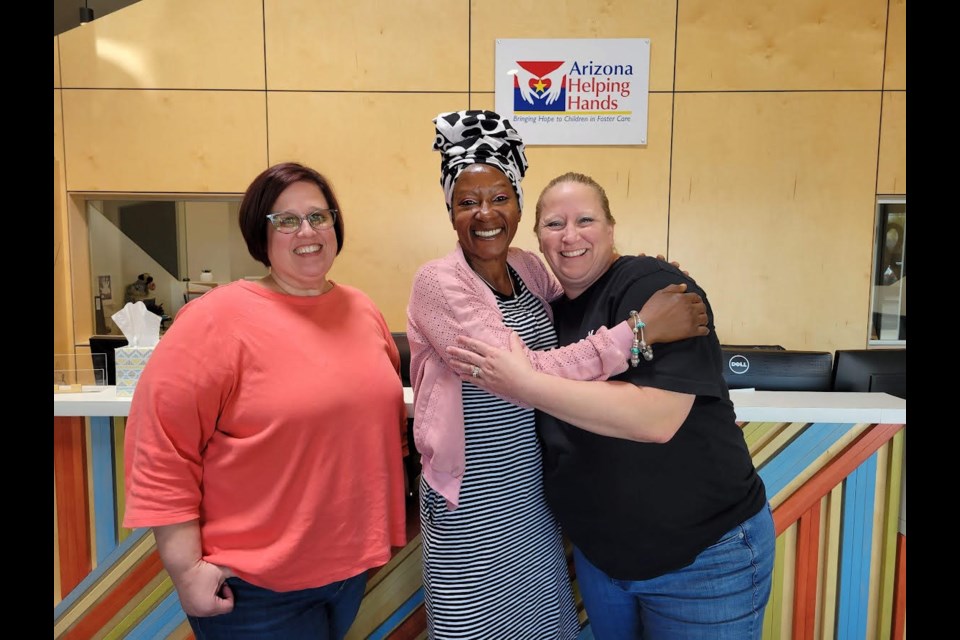As a mom of seven children, San Tan Valley resident Tracey Christian is no stranger to having a full house.
As her children grew up, she said she had quite a few kids in her home most days. However, as her own children entered high school, she said she’d have children stop by who didn’t have a safe place to return to at the end of the day.
Recognizing that there was a need to help children who lived in unsafe conditions, Christian decided to leave her banking job behind and start the journey of becoming a foster parent. She said she would allow children to stay with her as long as they went to school, that was her rule.
Now, 25 years later, Christian has been a foster mother to 20 children and is one of 3,000 foster care givers in Arizona. She emphasized that being a foster parent is very rewarding, but it’s not without its challenges. In addition to the rigorous application process, which includes a home visit and making sure a potential foster parent qualifies financially, emotionally and physically, there is also the concern of not having enough support or available resources.
"When I hear people say someone is doing this just for the money, I want to say: show me the money, where?" said Christian, explaining that although foster parents do get a daily amount for each child, it is roughly about $300 per month. After essentials, there is not much left over for extras, she added.
"We depend on places like Arizona Helping Hands to get things like a crib or a new bed," said Christian.
Organizations like Arizona Helping Hands have been an important resource for foster parents like Christian. She said programs like these make it easier to provide for the foster children and ensure they are experiencing the fun side of being a child - many of whom have been denied the chance in their previous living situations.
Matt Lipan, community engagement director for Helping Hands, says one way they do this is through their Birthday Dreams program.
"I learned that there are a number of kids on this foster journey who have never celebrated a birthday before," Lipan said. "When we heard thought, we thought no, no, that is not okay. Now any client - foster parent, tribal staff, DCS staff - can go online and fill out a form specific to the child, with questions regarding their interests, their age, their favorite colors, and things like that. We then have an awesome group of volunteers both individual and corporate, who curate a bag with five brand-new wrapped gifts and we get them out to the foster children. We've made bags with a brand-new Nintendo Switch or Xbox, a new skateboard, or a new bike."
In addition to special programs like Birthday Dreams, Arizona Helping Hands main goal is to provide essential items such as mattresses, cribs, beds, clothing, shoes, school supplies and more to foster children all over the state. The organization has been open for 25 years come this October and in the last decade, has honed in on their focus of helping the foster community throughout the state.
"We are now the largest provider of basic essentials for the foster community throughout the state of Arizona," said Lipan. "There's a wide range of services that we provide and in the last nine or 10 months, we've been really intentional about saying you know what, we are called Arizona Helping Hands, not Maricopa County Helping Hands... let's live into that and explore how we create more access to the rest of the state."
Lipan said the unique thing about his job is having the opportunity to travel throughout Arizona and listen to what foster families really need rather than making assumptions.
"We are really just listening to our community partners and our clients and then kind of pivoting based on whatever those needs are that they've communicated to us and how we can do a better job of helping them gain access to the items that we have," said Lipan.
Now in its 12th week, one way Helping Hands has tried to help its foster families is by offering a retail model instead of an appointment-only service model to attain the items they need.
"Now clients can come in and shop for what they need right away, rather than having to wait until their scheduled appointment," said Lipan. "We found that with appointments, we were booked almost two months out; it's just too far and it's too long for a family or case specialist to wait. If a client needs a crib for a baby, they can't wait two weeks and now they don't have to. Because of this new retail model, we have tripled the number of clients we've been able to serve now."
It's that kind of help that foster parents like Christian rely on, especially when it comes to making sure her foster children have everything they need.
"The most rewarding thing is when the children come back and they tell you thank you so much for everything you've done," Christian said. "I've had social workers tell me I give the kids too much, but if I'm told to treat them like my own, that's what I'm going to do. I need to be there for them, even though I can't save everybody, if I can save a few of them, it's better than not saving any."
To learn more about Arizona Helping Hands and how you can help, visit their website at azhelpinghands.org.



